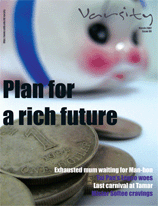


Periscope
'Generation of debt' lacks financial training in families, schools
Interactive activities are suggested to be used so that students can benefit from experience in the interactions.
“Role plays, debates and forums can be organised as these will stimulate students to consider the issue (of financial management) from different angles. However, teachers should debrief their students about the real meaning after the activities and inspire them to make judgments using different perspectives,” he said.
Some schools have already taken part in competitions, workshops and talks held on financial plannning by organisations and private companies. For example, Caritas St. Joseph Secondary School in Tsing Yi has taken a lead in encouraging students to join finance-related activities. The school has invited some youth and commercial associations like the Junior Achievement Hong Kong and the ACCA Hong Kong to provide workshops and seminars for students.
At the university level, some institutions have tried to use innovative ways to make students be more involved in financial issues.
The department of finance and decision sciences at the Hong Kong Baptist University set up an investment club last year, for example. The club obtained HK$900,000 donation as investment fund for student members to invest in the stock market.
“Actually, I think this is quite amazing. Although this is a usual practice in foreign countries, this has not been done in Hong Kong before,” said Stephen Yung Chi-ho, the first president of the investment club and a final year student.
Through practice, members learn how to make financial judgment to devise appropriate investment strategies and develop decision-making skills. “This practical experience is surely different from simulation as you will be more cautious in investing for fear of making a loss. You need to do more thinking,” Mr Yung said.
Real life experience is always more beneficial than book learning, he added.
10 tips of financial planning
1. Start financial planning now. Beginning good financial management habits early in life helps realise one’s dreams with less pain
2. Make saving a habit
3. Use monthly budgets to balance the income, savings, investments and spending
4. Divide the pocket money among necessities, entertainment, saving and investment, and set priorities for each
5. Distinguish between a need and a desire, and do not spend simply to satisfy the desire or vanity
6. Cut back on non-essential items, and prioritise the purchase of necessities according to the needs and urgency
7. Understand the risks of borrowing and spending with credit cards
8. Base investment decisions on research and good information
9. Check the risks before making any investment decisions
10. Set short- and medium-term investment targets based on own financial capability
(Source: “Rich Kid Poor Kid” project held by the Hong Kong Institute of Certified Public Accountants)
